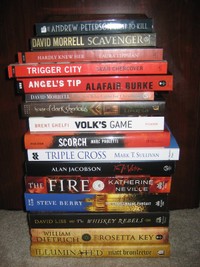These are things that people on my panel brought up. I wasn't taking notes, so this is all from memory.
Co-op is everything. Co-op is the industry term for cooperative advertising money. This is money paid by the publisher to booksellers in order to stock their books (in the case of airports and similar) and to give their books prime placement (in the case of bookstores). If you see a book in the front of B&N, it's likely that the publisher paid them to put it there. Co-op is the most expensive and the most important part of advertising that any book will receive. It is crucial for a book's success.
It's almost impossible to say how many books it takes to make the New York Times bestseller list. It varies wildly from week to week, depending on the competition. It's possible that you might make the list with as few as 7000 books sold in a week. But other weeks a book might sell many more than that and not even get close. (I did hear from a trusted source, not on the panel, that it takes a minimum of 35,000 books shipped in order to have a chance to make the list.)
Although making the New York Times list is important, it's more important to sell a lot of books. More books sold is always better than a higher ranking. It also doesn't matter if the book gets all its sales up-front, or if it gets them over the course of months. The total sales is what matters in the end.
Timing is very important to a book's success. (And that's why there are hardly any books being published this week -- everyone is staying away from Harry Potter.) The competition a book faces, especially in the initial weeks, can determine its fate. Thus the publishers track when everyone is publishing their books and schedule their own releases accordingly. The late fall is an especially busy time for big-name books.
Be nice to your editor. It's not her fault if the book does poorly. Also, be nice to your editor's assistant. They will often give authors information they aren't supposed to have, especially if the editor is on vacation.
BookScan numbers can be unreliable, but there is disagreement as to how unreliable. They probably track around 60-70% of sales, but this can vary depending on the type of book. (A subscription to BookScan, by the way, runs 6 figures annually.)
Online sales aren't very important for bestsellers. For someone like Tess Gerritsen, Amazon only represents 3% of total books sold. Also, Amazon rankings don't mean much. A book can jump significantly with only minimal sales.
The big box stores (price clubs, WalMart, etc.) are extremely important for mass success. If a book isn't sold in those stores, it's unlikely to be a bestseller. Sales through those outlets amount to as much as 40% of a bestseller's total sales. However, for first-time or unknown authors, the chance of your books being sold there is very small. So don't expect it.
The cover of a book is the single most important factor in closing customer sales. Covers are often a contentious topic between publishers and authors, and publishers don't do much in the way of market testing to find out what works. (The publishing industry in general doesn't do much market research.) If an author is going to complain about a cover, it's best to have specific areas of objection, and suggestions for improvements. Bestselling authors like Gerritsen can get cover approval, but new authors cannot.
It's hard to get your book reviewed if you're a first-time author. It's hard to get your book reviewed if you're an unknown author. It's hard to get your book reviewed no matter what! (It's not impossible, though. And it helps if the book is interesting and fresh.)
The best way to get your book reviewed, and the best way to have it be a success, is to write the best book you possibly can. And that is the one area of the process over which an author actually has control.
 A couple of these are books that authors gave me, but the rest were just being handed out. It was ARC city! As I was picking them up, I kept reminding myself: "They'll send these to you at home, Dave. You don't need to schlep them around." But it was nice to get several of them signed.
A couple of these are books that authors gave me, but the rest were just being handed out. It was ARC city! As I was picking them up, I kept reminding myself: "They'll send these to you at home, Dave. You don't need to schlep them around." But it was nice to get several of them signed.
